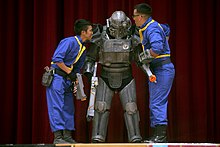The Brotherhood of Steel is one of the most iconic factions in the Fallout series. Known for its advanced technology, militaristic approach, and strict policies, the Brotherhood is deeply concerned with controlling, studying, and in some cases, suppressing technology. The organization’s role in the Fallout universe is not just that of a militarized group; they are also gatekeepers of some of the most dangerous and advanced technologies in the post-apocalyptic world. Their central ideological belief—that technology must be closely monitored and controlled to prevent it from leading to humanity’s self-destruction—shapes their every move.
This article will further explore the Brotherhood’s complex relationship with technology, their role in technological suppression, and the broader impact of their actions in the Fallout universe. We will also look at the major philosophical, political, and moral implications of their policies, as well as their ever-evolving ideology as seen across the Fallout series.
1. The Origins of the Brotherhood of Steel
The Brotherhood of Steel’s origins trace back to the events following the Great War, which caused a global nuclear apocalypse in 2077. Before the war, the Brotherhood was originally a division of the U.S. Army known as the Sentinels, which was tasked with researching, utilizing, and advancing military technology. In the aftermath of the war, these soldiers and scientists, led by former military officers and engineers, survived the initial catastrophe by hiding in the underground Bunker Alpha, later renamed the Lost Hills Bunker, which became the heart of the Brotherhood.
The Brotherhood began as a group dedicated to preserving technology for future generations, learning from the mistakes of the pre-war world. Their immediate goal was to find, secure, and safeguard pre-war technology, which was seen as both a potential tool for survival and a double-edged sword that could be misused.
Over time, the Brotherhood’s ideology began to crystallize around a key belief: that humanity was not ready for the powerful technology it had created, and that only a select few could be trusted to handle it. The organization became highly hierarchical, focusing on preserving and controlling technology to prevent another global catastrophe. Their militaristic structure emphasized strict codes of conduct, discipline, and control over any form of advanced technology.
1.1 The Rise of the Brotherhood’s Technological Domination
The Brotherhood’s early years saw a focus on recovering pre-war military tech, including power armor, advanced weaponry, and robotics. This technology was seen as a powerful tool for their long-term survival and was vital to their mission of controlling the remnants of humanity’s greatest creations. But as their knowledge grew, so too did their fear of what unchecked technological advancements could do to the world. They realized that their role was not only to protect the technology but to actively control it, even if that meant suppressing some advancements.
This mindset led to the Brotherhood’s first major internal divide: should they share their technological discoveries with other factions or keep it all for themselves? The answer was clear—control was paramount. They would not share their knowledge freely, believing that the wrong hands could misuse it.
2. The Brotherhood’s Technological Philosophy: Guardians or Suppressors?
The Brotherhood of Steel’s stance on technology is complex and paradoxical. While they are undeniably the stewards of some of the most advanced technology in the Fallout world, they also fear its potential for misuse, which often leads them to suppress or destroy certain technologies. Their fear of the catastrophic consequences of unchecked technological use drives many of their decisions, but it also puts them in direct conflict with other factions and individuals who wish to advance or democratize technology.
2.1 The Principle of Technological Exclusivity
The Brotherhood believes that only a select group of highly trained individuals—their own ranks—should have access to the most dangerous and powerful technology. To that end, they actively prevent the general populace, or less-qualified factions, from acquiring advanced tech. This belief leads to some of the Brotherhood’s most controversial actions, such as preventing the New California Republic (NCR) and other factions from obtaining critical technologies that could help them rebuild society.
Their technological exclusivity is both a protective and authoritarian stance. While their motivations are rooted in the desire to avoid another apocalyptic war, their refusal to share technology or allow others to innovate leads to friction with other factions. The NCR, for instance, is often portrayed as a faction that believes technology should be used to rebuild and help society thrive, while the Brotherhood sees this as a potential road to disaster.
2.2 Technological Suppression as Protection
On a more personal level, members of the Brotherhood often justify their technological suppression by framing it as a protective measure for humanity. The Brotherhood views itself as humanity’s last bastion against the dangers of technology, believing that only through controlling the most dangerous technologies can they prevent the same mistakes that led to the Great War.
For example, their suppression of advanced AI technology stems from the belief that artificial intelligence—particularly self-aware or autonomous AIs—was a contributing factor to the pre-war apocalypse. The Brotherhood of Steel’s refusal to allow any form of autonomous AI, such as the Institute’s synths, is a direct consequence of their fear of repeating the past. They are convinced that the unchecked growth of AI will ultimately lead to the enslavement or destruction of humanity.
3. Key Examples of Technological Suppression
Throughout the Fallout series, the Brotherhood’s role in suppressing technology has had profound consequences, not just for their faction but for the entire world. Here are some notable instances where the Brotherhood’s efforts to control or destroy technology are evident.
3.1 Fallout 3: Brotherhood vs. The Enclave
In Fallout 3, the Brotherhood of Steel faces its greatest challenge from the Enclave, a faction that represents the opposite approach to technology. The Enclave, a remnant of the U.S. government, is willing to use any technology necessary, even weapons of mass destruction, to assert their power. The Brotherhood’s technological suppression in this context is portrayed as a fight for survival, as they oppose the Enclave’s use of the FEV virus and other advanced technologies that could spell disaster for the wasteland.
The Brotherhood sees itself as the guardian against the Enclave’s plan to dominate the wasteland, and they actively work to destroy the Enclave’s facilities, including the Project Purity project. Their opposition to the Enclave, with its desire to exploit technology for control and dominance, exemplifies the Brotherhood’s firm belief in keeping technology out of the wrong hands.
3.2 Fallout: New Vegas – The Division over Technological Sharing
In Fallout: New Vegas, the Brotherhood’s internal division over the sharing of technology becomes more pronounced. While the group has traditionally been isolationist, some factions within the Brotherhood are willing to cooperate with the New California Republic (NCR) and other factions to share technology in order to help rebuild civilization. This divide within the Brotherhood reflects larger debates over whether technology should be closely guarded or allowed to flourish to help restore society.
This conflict is particularly apparent in the Brotherhood’s interaction with the NCR. The NCR, a burgeoning republic trying to restore order to the wasteland, is often depicted as wanting access to the Brotherhood’s advanced technology. The Brotherhood, however, remains highly secretive, fearing that the NCR’s rapid expansion will lead to the misuse of their technological advancements.
3.3 Fallout 4 – The Institute and Synths
In Fallout 4, the Brotherhood is engaged in a full-scale war with the Institute, a faction that represents an extreme form of technological progress. The Institute, known for its development of synths (synthetic humans), is seen by the Brotherhood as a significant threat to humanity. The Institute’s technology allows them to create life-like robots that are indistinguishable from humans, leading to ethical and moral dilemmas that the Brotherhood is unwilling to tolerate.
The Brotherhood’s mission in Fallout 4 centers around destroying the Institute and its creations. They view the Institute’s technological advancements as both a moral abomination and a potential threat to the survival of the human race. The Brotherhood’s suppression of the Institute’s technology is framed as a necessary step to avoid the creation of a new technological overlord.
4. Philosophical and Ethical Implications
The Brotherhood of Steel’s stance on technological suppression is not just a matter of politics or military strategy; it also raises significant philosophical and ethical questions. At its core, the Brotherhood’s fear of technology speaks to the broader question of how societies should handle powerful innovations that have the potential to destroy or rebuild the world.
4.1 The Fear of Technological Hubris
The primary philosophical issue the Brotherhood grapples with is technological hubris. The Fallout universe is filled with examples of civilizations that advanced too quickly without understanding the long-term consequences of their actions. The Great War, which destroyed the world, is the most glaring example of how unchecked technological progress led to global catastrophe. The Brotherhood of Steel, while dedicated to preserving knowledge, fears that humanity’s urge to advance will once again lead to disaster. Their technological suppression is a direct result of their belief that humans are not capable of managing the power they create.
4.2 The Dangers of Power Without Responsibility
The Brotherhood also embodies the idea that power without responsibility is dangerous. This is particularly evident in their reluctance to share technology with other factions. While this is often seen as an act of control, it is also a form of caution. The Brotherhood’s philosophy hinges on the idea that not all factions, particularly those with less advanced tech or experience, can be trusted with the powerful weapons and knowledge they have safeguarded. In their eyes, the misuse of power, whether through the use of nuclear weapons or advanced robotics, could lead to an extinction-level event.
5. Conclusion: The Legacy of the Brotherhood’s Technological Suppression
The Brotherhood of Steel’s approach to technology—at once protective and suppressive—continues to be one of the defining elements of the Fallout series. They act as guardians of technology, fearing its potential for destruction, but they also create a society that is deeply divided over how to handle innovation and progress.
Their fear of repeating the mistakes of the past often puts them at odds with other factions, who view the Brotherhood’s technological secrecy as a barrier to progress. While the Brotherhood believes it is acting in humanity’s best interest by keeping dangerous technologies out of the wrong hands, their strict control also highlights the risks of authoritarianism in a world rebuilding from the ashes of nuclear war.
Ultimately, the Brotherhood of Steel’s story is a cautionary tale about the power of technology. In their efforts to suppress its potential for harm, they also face the possibility that their isolationist policies may prevent humanity from advancing. In the Fallout universe, the question remains: Can technology be safely harnessed for the benefit of society, or is the greatest danger in letting it fall into the wrong hands.for more posts also read this networksights.com














Leave a Reply